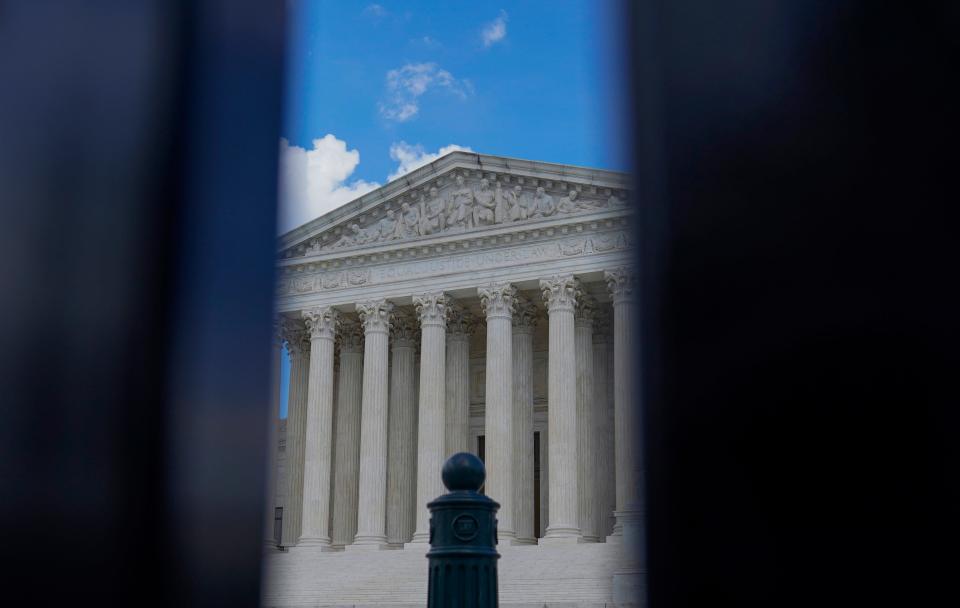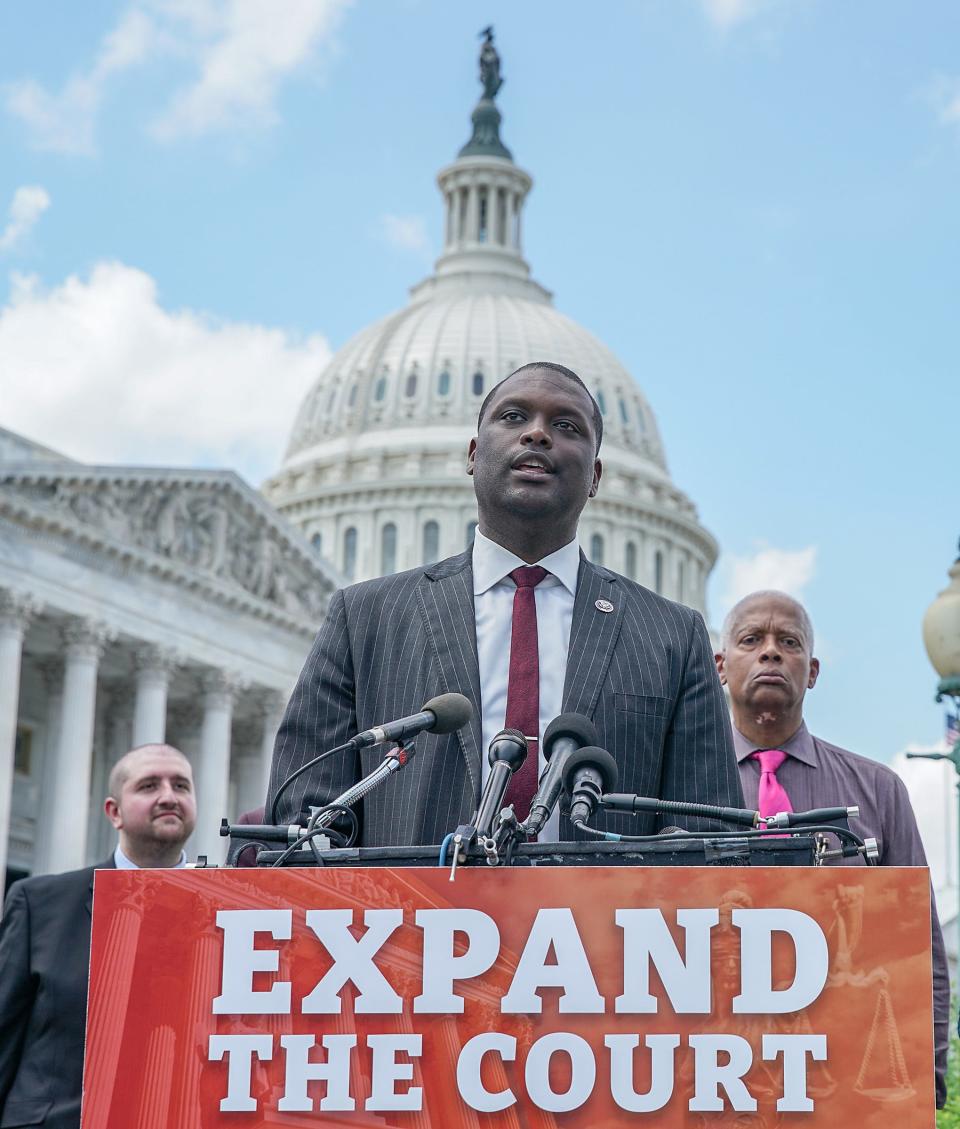As Supreme Court turns right, expansion supporters see opportunity in midterms
- Oops!Something went wrong.Please try again later.
Correction: An earlier version of the story misstated the number of sponsors for legislation to expand the Supreme Court. There are three sponsors in the Senate and 59 in the House.
WASHINGTON – Progressive Democrats are hoping to capitalize on the blockbuster decision to overturn Roe v. Wade to make expanding the Supreme Court a midterm election issue – at least in Democratic primaries – despite fierce political headwinds.
Although calls from the left to increase the number of justices on the court's nine-seat bench or impose term limits have been dismissed by Democratic leaders – and pummeled by Republicans – liberal groups and a handful of congressional candidates are raising the issue to harness resentment over the Supreme Court's most recent term.
Though the strategy would be risky in competitive districts – where the issue will take a back seat to spiraling inflation and President Joe Biden's tanking approval ratings – some of the groups are eager to try it in races where a Democrat is likely to win in November. Polls show many Democratic voters are losing faith in the Supreme Court.
"The end-of-term decisions, I do think, raise the possibility of some shift in the larger dynamic," said Brian Fallon, president of Demand Justice PAC, a group that supports court expansion and that on Friday endorsed seven congressional candidates for the first time. "The first step in having the pendulum swing...the other way is in building that muscle among Democratic voters, to be consistently attentive to this issue."
Barrett: How Justice Barrett is wielding enormous influence on the Supreme Court
Campaign: Overturning Roe a triumph of long push by conservative legal movement
Analysis: Supreme Court ends historic term with big shift to the right on abortion, guns
The endorsements, which landed in heavily Democratic districts, include Rep. Mondaire Jones, who is running in a crowded primary in a newly drawn district that includes Lower Manhattan and parts of Brooklyn, and Rep. Andy Levin, who is facing another incumbent, Rep. Haley Stevens, in a new district outside Detroit. Both Jones and Levin are sponsors of House legislation to add four justices to the court.
Republicans say they're more than happy to have a conversation about court "packing" when voters head to the polls for the general election in November.
"Voters overwhelmingly oppose expanding the Supreme Court, reckless spending, defunding police, and just about every other radical policy Democrats are pushing in Washington," said Mike Berg, a spokesman for the National Republican Congressional Committee, which helps elect GOP candidates to the House of Representatives. "That is why Democrats are going to face an electoral wipeout in November."

It's been 153 years since Congress added seats to the Supreme Court and 85 years since President Franklin D. Roosevelt, frustrated by the court's hostility to his New Deal policies, tried and failed to do so. Court expansion hasn't been taken seriously by the leadership in either party since. Opponents, including some on the left, fear that adding justices would encourage a tit-for-tat reprisal by Republicans when they're in control.
Biden created a commission to study changes to the court but declined to make recommendations one way or the other. Days after the court's abortion decision, a White House spokeswoman made clear that Biden doesn't support expansion.
But the high court's 6-3 conservative majority nevertheless aroused fury on the left last month by overturning the 1973 Roe decision that established a constitutional right to abortion, invalidating a New York law that limited who could carry handguns in public and blurring the line that separates church and state in a series of decisions. The question is whether those rulings have changed the political landscape for the court's critics.
"To me, it's about getting more members to the realization that they don't just have to let the court run amok," said Gabe Roth, executive director of Fix the Court, a nonpartisan group that has pushed for greater transparency and other changes to federal courts. "I'm trying to get folks to realize that Congress has a role to play on the structure and function of the court and it's just a muscle that they haven't exercised in 30 years."
Roth's group, which doesn't engage in elections, has supported other proposals, including term limits for the justices. Roth has never viewed those changes as a partisan matter: Some of the ethics proposals he has sought, for instance, would affect liberal-leaning jurists just as much as those nominated by Republican presidents.
Even as confidence in the court has fallen in polling in recent weeks, support for adding justices has barely budged. Only 28% of Americans have a "great deal" or "quite a lot" of confidence in the Supreme Court, down from 39% two years ago, according to a Marquette Law School poll released this week. But when asked about increasing the number of justices, 49% said they support the idea, up only 3 percentage points from 2020.
Perhaps even more telling: Even Democrats have been cautious about sponsoring legislation aimed at expanding the court. Only three Democratic senators – Sens. Elizabeth Warren of Massachusetts, Tina Smith of Minnesota and Ed Markey of Massachusetts – have backed that chamber's court expansion bill. The House version has 59 sponsors, though only two signed on to back the proposal in the days after the Supreme Court handed down the abortion decision.
Expanding the court would be "a disaster for the nation and any party that embraced it," said Paul Summers, a former Tennessee attorney general and co-chair of the Keep Nine Coalition, a group that is supporting a constitutional amendment to fix the court's membership at nine seats. "If one party packed the court, another party with a new majority would retaliate by trying to pack the court again."

Supporters point to other surveys from left-leaning polling firms that indicate a high degree of support for court expansion among Democratic voters.
"The American people don't want to be ruled by a Supreme Court that wants to take them back to the 1800s and is so dramatically out of step with where they are," said Sarah Lipton-Lubet, executive director of Take Back the Court, a group that has been pushing for court expansion. "Conservatives have been laser-focused on turning the courts into a political tool for their own use for decades."
Four years ago, Lipton-Lubet said, the idea was "completely off the radar." Now, she says, the issue is gaining steam.
And that speaks to a broader strategy that appears to be developing on the left: Many advocates acknowledge that changing the Supreme Court is an endeavor that will likely take years, if not decades. Conservative legal groups, many of which spent decades fighting and organizing over the courts after Roe, know that all too well.
The high court has already popped up in some primaries this year. Wisconsin Lt. Gov. Mandela Barnes, who is seeking the Democratic nomination for Senate, announced his support late last month for imposing term limits on Supreme Court justices. A campaign spokeswoman told the Milwaukee Journal Sentinel that Barnes was "open to the conversation" about expanding the size of the court, stopping short of an endorsement of the idea that one of his competitors in the race embraced.
The winner of the Aug. 9 primary will face Republican Sen. Ron Johnson in November.
Fallon, a former Justice Department official and aide to Senate Majority Leader Chuck Schumer, D-N.Y., believes the tide may be turning, just as it eventually turned for conservatives in the decades after Roe was decided.
"It was long held tenet in Democratic politics that if you talk about the Supreme Court, it will backfire because it will mobilize Republican voters more than it will galvanize your voters," Fallon said. "We have to unlearn that lesson. The pendulum is swinging back."
This article originally appeared on USA TODAY: Supporters of expanding Supreme Court see opportunity in midterms

